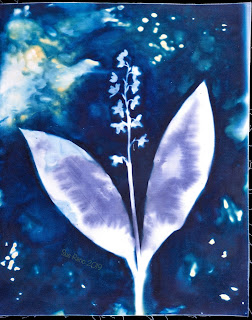I made these prints earlier in May, on a nice sunny warm day. They are on my favorite cotton sateen that I treated with the cyanotype chemicals. I used some of the newly emerging greenery from my perennial beds, including a hosta, and two wood poppy leaves.
You can see the developing seed pods on this one. It's such an interesting plant.
I also caught the tail end of the variegated Solomon's seal blooms.
I could tell right away it was going to be an energetic set of wet cyan prints. Here they are after exposure, but before rinsing out.
There's a LOT going on here, and I love it.
The wood poppy leaves and stems have yellow sap in them, so they tend towards a partial eco-print effect.
This one is looking dark and mysterious at this stage.
Here are the finished prints. I am just delighted with them.
There's lots of sparkling disturbances in these.
You can especially see the eco-print effect in the two seed pods here, and on the leaf veins.
I love the how the tones deepen towards purple on this one.
If you are a regular reader, thanks for stopping by!
If you are new here, you can follow all 40 parts of my wet cyanotype adventure, with all the tips and tricks and images, by clicking on the Wet Cyanotype tab in the top header, or by going here.
You can also follow along on your social media of choice:
Facebook page:http://www.facebook.com/suerenostudio
Twitter feed: http://twitter.com/suereno
Tumblr: http://suerenostudio.tumblr.com
Instagram: https://www.instagram.com/sue_reno_studio/
May 24, 2019
May 4, 2019
Experiments in wet cyanotype - part 39
It was time for more spring flowers to get the wet cyanotype treatment. The season on most of these is very fleeting so it's important to pause and appreciate them. First up are some stalks of variegated Solomon's seal in bloom. This is not a particularly showy plant, but it is a very satisfying one to grow. It starts in the spring with pink sheaths on the emerging foliage, develops into lovely variegated stalks, has a brief moment for waxy white flowers, and decays very slowly in late fall, turning translucent along the way.
Up next was another sprig of bleeding heart, which is having a great run in our mostly cool and damp spring.
And last but not least is a sprig of lily of the valley. It has a very short bloom season, and some years I've missed observing it entirely. I'm glad I caught it, and the incomparable scent, this time around.
It was a bright but cloudy day, no direct sun, temperatures in the high 60s Fahrenheit. That's not ideal for maximum wet cyan weirdness, but it is good for exposing delicate flowers. I left them out about 6 hours.
These are the exposed, unrinsed prints. That green is typical of of a lowish temperature exposure; it looks cool but generally rinses out.
The purple tones inside the leaf shapes are also typical of this kind of exposure, but they often stay put.
These last two have some golden speckles around the edges thanks to a bit of soda ash.
Here are the finished prints. I think they turned out very well. The Solomon's seal looks so elegant, and has just the right amount of coloration across the top.
This one is also quite pleasing. If I was into giving them fanciful names I would call it Duet.
This bleeding heart print is a bit crowded, but in the best possible way. There's a lot to look at here.
The lily of the valley print is very balanced, serene and delicate.
If you are a regular reader, thanks for stopping by!
If you are new here, you can follow all 39 parts of my wet cyanotype adventure, with all the tips and tricks and images, by clicking on the Wet Cyanotype tab in the top header, or by going here.
You can also follow along on your social media of choice:
Facebook page:http://www.facebook.com/suerenostudio
Twitter feed: http://twitter.com/suereno
Tumblr: http://suerenostudio.tumblr.com
Instagram: https://www.instagram.com/sue_reno_studio/
Up next was another sprig of bleeding heart, which is having a great run in our mostly cool and damp spring.
And last but not least is a sprig of lily of the valley. It has a very short bloom season, and some years I've missed observing it entirely. I'm glad I caught it, and the incomparable scent, this time around.
It was a bright but cloudy day, no direct sun, temperatures in the high 60s Fahrenheit. That's not ideal for maximum wet cyan weirdness, but it is good for exposing delicate flowers. I left them out about 6 hours.
These are the exposed, unrinsed prints. That green is typical of of a lowish temperature exposure; it looks cool but generally rinses out.
The purple tones inside the leaf shapes are also typical of this kind of exposure, but they often stay put.
These last two have some golden speckles around the edges thanks to a bit of soda ash.
Here are the finished prints. I think they turned out very well. The Solomon's seal looks so elegant, and has just the right amount of coloration across the top.
This one is also quite pleasing. If I was into giving them fanciful names I would call it Duet.
This bleeding heart print is a bit crowded, but in the best possible way. There's a lot to look at here.
The lily of the valley print is very balanced, serene and delicate.
If you are a regular reader, thanks for stopping by!
If you are new here, you can follow all 39 parts of my wet cyanotype adventure, with all the tips and tricks and images, by clicking on the Wet Cyanotype tab in the top header, or by going here.
You can also follow along on your social media of choice:
Facebook page:http://www.facebook.com/suerenostudio
Twitter feed: http://twitter.com/suereno
Tumblr: http://suerenostudio.tumblr.com
Instagram: https://www.instagram.com/sue_reno_studio/
Subscribe to:
Comments (Atom)























